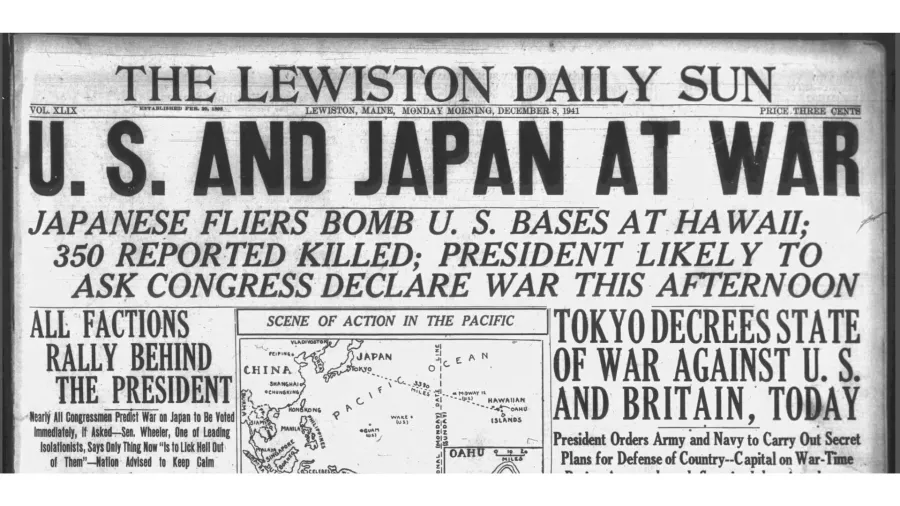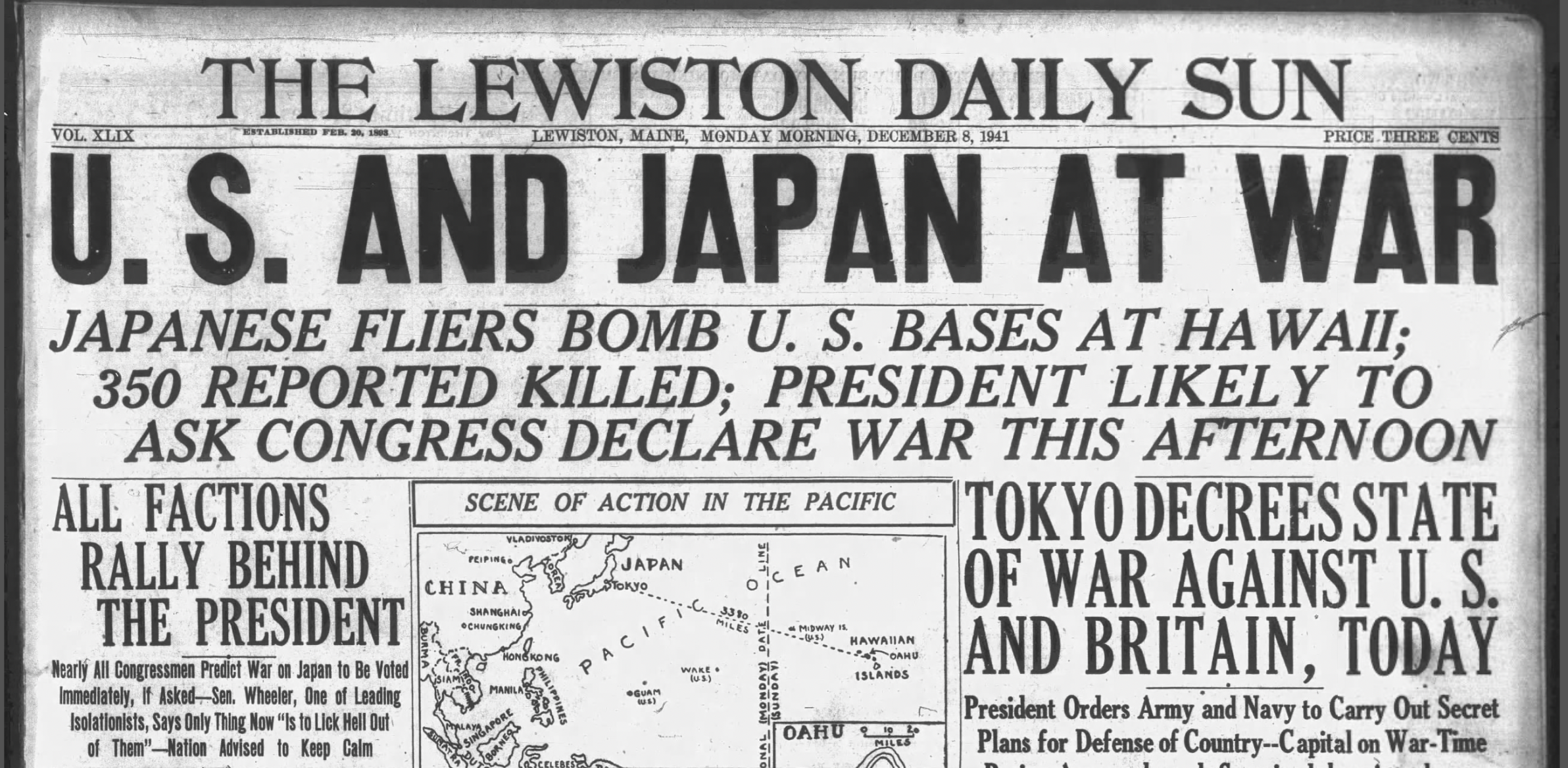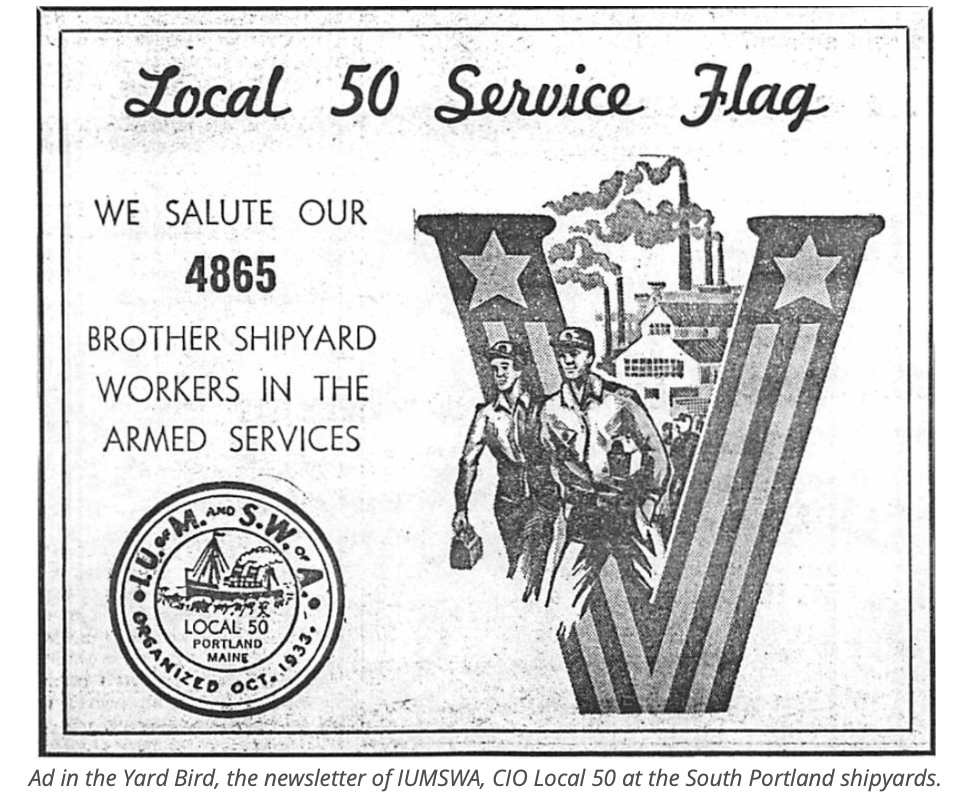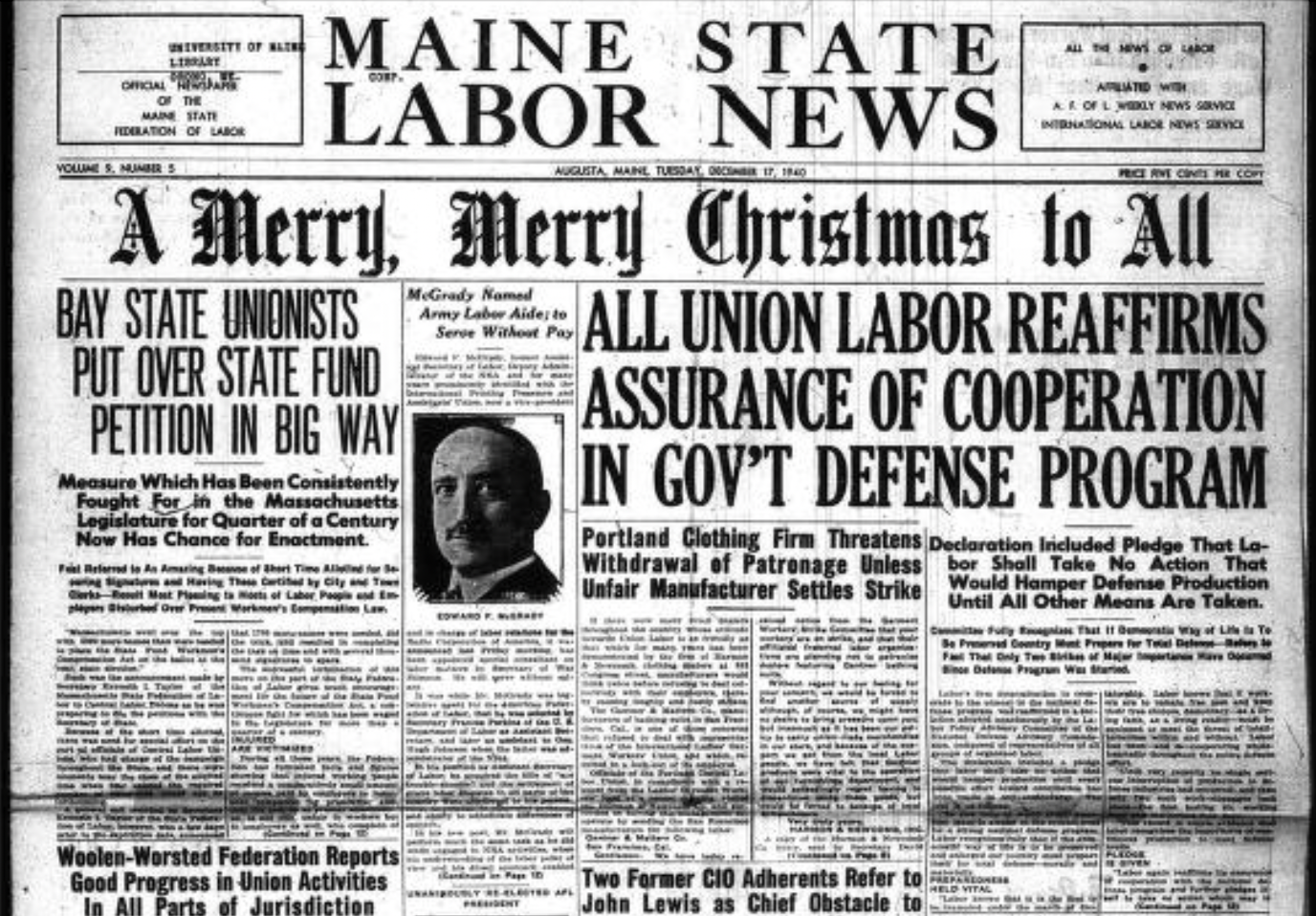Maine Workers & the March to World War II

In the past several weeks, we’ve covered the first successful union drive at Bath Iron Works and the wildcat strikes that followed at the height of World War II. Initially we were going to cover the victory of workers in the South Portland shipyards in organizing with the CIO this week. However, with today being the 82nd anniversary of the Japanese bombing of Pearl Harbor we felt it’s an appropriate time to discuss the lead up to the war and the role of Maine workers in building the massive arsenal necessary to defend democracy and freedom throughout the world.
In the lead up to World World II, Mainers were divided about entering the war. In fact, even as Hitler’s army invaded Poland and Britain declared war on Germany in 1939, Maine’s entire Republican congressional delegation — Senators Wallace H. White and Frederick Hale and Representatives Oliver (South Portland), Clyde Smith (Skowhegan) and Ralph Owen Brewster (Dexter) — opposed getting entangled in another war in Europe. Gradually, over the next two years, all of them except Oliver would moderate their positions and unite in support of the war effort.
As Maine labor historian Charlie Scontras wrote in his book “Labor in Maine: Building the Arsenal for Democracy: 1939-1952,” pacifist groups like the League of Peace and Freedom chapters in Portland and Bangor and isolationists in the 800,000-member America First Committee organized against military intervention in Europe.
In 1940, President Franklin Roosevelt campaigned on keeping the US out of the war, stating famously, ”I have said this before, but I shall say it again and again and again; your boys are not going to be sent into any foreign wars." However, he strongly supported Britain in its fight against the Nazis and believed that the US should serve as a "great arsenal of democracy.” It was clear that Hitler was not going to give up his fanatical ambition to conquer Europe for the benefit of the so-called Aryan race, except by force.
As Francis Rexford Cooley writes, although Maine was a majority Republican state, they were not necessarily isolationists. In 1939, Rep. Ralph Owen Brewster found support for amending the nation's neutrality laws after polling 8,000 Maine Republicans. Shortly after, he voted to lift an arms embargo with Britain and France and prohibit trade with “belligerent” countries like Germany.
Then in July of 1940, after the German Navy destroyed eleven British destroyers over a ten-day period President Roosevelt responded by exchanging 50 destroyers for 99-year leases on British bases in Newfoundland and the Caribbean. Maine State Labor News, the news organ of the Maine State Federation of Labor, AFL, supported the decision, but the Bath Daily Times complained that the government wasn’t moving fast enough on approving contracts to build new warships.
Congressman Oliver, on the other hand, blasted FDR’s unilateral decision, stating that the President was moving toward a "military dictatorship in America.” He closely aligned with the isolationist aviator Charles Lindbergh and the America First Committee and sent reprints of Lindbergh’s testimony against the Lend-Lease Act to constituents. Oliver received withering criticism from voters and the press for his ties to the controversial Lindbergh and America First, which attracted many prominent anti-semitic and fascist sympathizers like automobile baron Henry Ford.
In September 1940, Congress enacted the first peace time draft in US history and Japan signed a mutual-assistance pact with Germany and Italy. The following March of 1941, it also passed the Lend-Lease Act to "lend-lease or dispose of arms" and other supplies needed by any country whose security was vital to the defense of the US. The act resulted in billions of dollars in arms and munitions going to Britain on the Western Front and the Soviet Union on the Eastern Front.

The America First Committee eventually opened an office in Portland in Sept. 1941, but by then the wheels of war set in motion. The rest of the congressional delegation except Oliver coalesced behind Great Britain. Once the Japanese bombed Pearl Harbor on December 7, 1941, the US entering the war was a forgone conclusion. Robert Hale crushed Oliver in a GOP primary in June, 1942, delivering a decisive defeat to isolationism in Maine.
Even before Pearl Harbor, there were also strong economic incentives for Maine’s congressional delegation to support the war. Previously a major part of BIW's business was building yachts, but demand for them declined precipitously during the Great Depression, causing the workforce to shrink. Thanks to a record $3.9 billion defense appropriation from Congress, BIW was awarded eleven destroyer contracts and the Portsmouth yard received six new submarine contracts in September 1940. To meet the demand for warships, BIW also joined a syndicate of other shipyards to form the New England Shipbuilding Corporation and began construction on the new Todd-Bath shipyard in South Portland, right in the heart of Rep. Oliver's district, in August, 1941.

Additionally, Congress provided $5 million for construction of an Air Corps base in Bangor to protect America’s eastern-most border from German attacks. The Maine State Labor News enthusiastically reported in December, 1940 that the project amounted to the “biggest building boom ever known by Bangor Building Trades mechanics.”The war economy promised huge gains for both businessman and Maine workers. The wartime boom pulled tens of thousands of Mainers out of the Depression as unemployment plunged from 17.2 percent in 1939 to less than 2 percent in 1945.
“For the first time in American history an intensive effort will be made to revive every ‘ghost town’ where factories have been abandoned and workers left stranded,” announced Sidney Hillman, head of the labor division of the National Defense Advisory Commission in Maine State Labor News in November, 1940.

From the textile factories of Lewiston to the farms of Aroostook County, the shipyards, paper mills and Downeast fish canneries, Mainers set to work around the clock to support the war effort. Union leaders patriotically declared that their rank and file members were prepared to “cooperate to the utmost in the national defense program."
“Labor knows that it is the first to be trampled under the march of dictatorship,” announced the union representatives on the Labor Policy Advisory Committee of the National Defense Advisory Commission following the attack on Pear Harbor. “Labor knows that if workers are to remain free men and keep their free choices, democracy — as a living faith, as a living reality — must be equipped to meet the threat of totalitarianism within and without. Labor has been — and is — cooperating wholeheartedly throughout the entire defense effort.”
Next week: Maine workers join the war effort.
